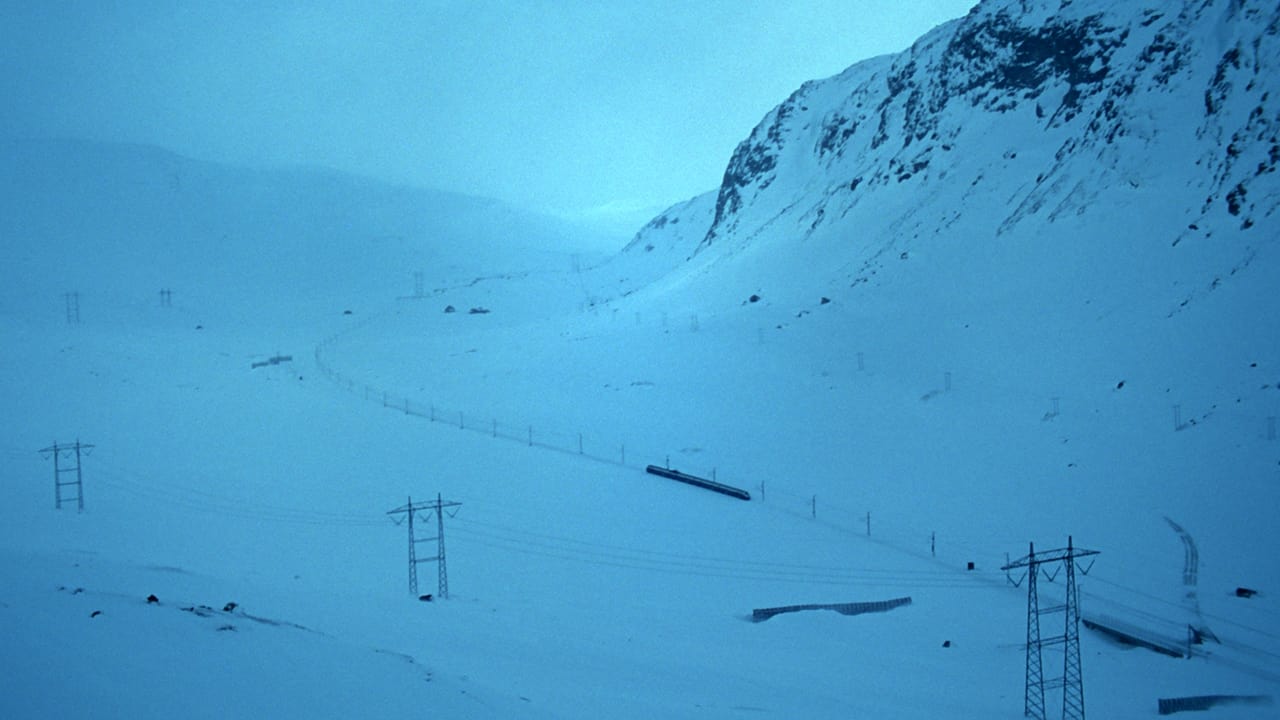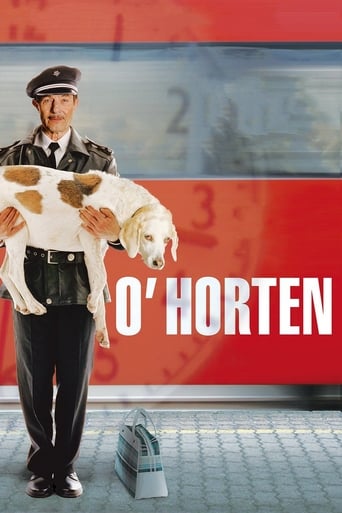

The consensus here at IMDb seems to be that this is a fine effort and I'll go along with that. Because I know nothing of Norway, the Norwegian people and/or culture it would be reasonably easy to go along with the surreal aspects of Bent Hamer's film and take it at face value but common sense kicks in and says that it is unlikely in the extreme that so many odd balls would cross the path of Odd Horten in so short a time. On the plus side there is no attempt to rationalise (for example) the young boy who, far from being fazed to find a strange old man outside his bedroom, asks the man to sit with him until he falls asleep - this, of course, in a world where we see paedophiles under the bed. If, however, you can get past this then you will think nothing of the chef being led away in handcuffs in front of diners in a restaurant followed by the waiter announcing 'for obvious reasons I will not be taking any further orders for food' and life just going on. These are but two slightly bizarre moments in a film studded with them so you can take it or leave it. For the record I took it.
... View MoreIn Norway, the sixty-seven year-old train machinist Odd Horten (Bård Owe) retires after forty years of service. He receives a silver locomotive from his colleagues in a dinner party and loses his last trip. After the retirement, the plain Horten seems to be lost and wanders through Oslo, where he helps Trygve Sissener (Espen Skjønberg) and they become friends. When Trygve invites him to take a ride in his car, the driver dies and Horten takes his dog Molly and his pair of skies. Horten has never worn a pair of skies and he tries for the first time. Later he travels with Molly and meets his old friend Svea (Henny Moan)."O' Horten" is a cold film about retirement in Norway. The story is weird and the behavior of the characters is strange for a Brazilian. When the cooker is arrested in the restaurant, nobody moves from their tables. When Mr. Horten forgets his silver train at the room, his colleagues send it by mail. These cold relationships are really unusual in my tropical country. My vote is six.Title (Brazil): "Caro Sr. Horten"("Dear Mr. Horten")
... View MoreUnpredictably eccentric and deeply humane little fable about finding new ways to a meaningful life.The protagonist's little episodic adventures recall Jacques Tati's sketches, albeit without their structural pay-offs. There's more to the highly original proceedings, but heavy-handed symbolism is fortunately absent.The director follows his offbeat path with a sure handling of the material and without unnecessary side trips towards more conventionally melodramatic, sentimental or overly cutesy directions.A real charmer.8 out of 10 blindfolded car drives
... View MoreIn Norwegian director Bent Hamer's third film to be seen Stateside (following 'Kitchen Stories' and 'Factotum'), a man named Odd Horton (Baard Owe) retires after 40 years as a train conductor. His face is as wrinkled as scrunched-up parchment, but he's erect and vigorous enough. What the heck is he going to do now? Clair Denis' wonderful '35 Shots of Rum' (whose US release is coming later this year) also begins with the idea that without tracks and timetables to show him the way a railroad engineer who's put out to pasture may be particularly lost, as wage earners go, even desperate. Denis' is an ensemble film full of warmth and connectedness, but sad for the conductor. Horton, who's odd, alright, maintains a Nordic blankness we never penetrate, but -- sadly, it seemed to me -- his meanderings end happily enough. After enduring so much wry tedium one would like to have been rewarded with a little more pessimism.Because he's a solitary who keeps a bird in a cage, which he covers when he goes out, Horton gives a momentary hint of Alain Delon's lonely samurai in Jean-Pierre Melville's classic noir. One may also contrast Horton's dry world with the garish and curiously tonic pessimism of Islandic helmer Aki Kaurismaki, who concluded his "Loser Trilogy" with 'The Lights of the City,' which records the downfall of a pathetic loser who becomes a would-be gangster, an utterly failed samurai. Horton, perhaps unwittingly, flouts convention and even breaks the law. When he loses the way back to his retirement celebration he winds up breaking and entering, he flees from lesbian lovers who interrupt his midnight swim wearing the high heels of one of them, and he abandons a corpse in a car. To please his near-catatonic aged mother, whose only response when he visits her is a smile he does not see when he refers in leaving to her youthful prowess as a ski jumper, he steals a pair of old skis and for the first time in his life does some late night ski-jumping of his own. Earlier, he consents to ride with a very odd man (odder than Odd) who claims he knows how to drive blindfolded, again at night, in a classic Citroen DS.Some of the dry jokes seem gratuitous. Odd habitually dines alone in an old-fashioned restaurant. The cook is taken out in handcuffs by police and the waiter, a wrinkled-faced Buser Keaton type just like Horton, announces to the room, "Of course don't expect me to take any more food orders." What are we to make of the old man who keeps coming back into the tobacco shop to ask for matches, because he keeps losing them? At moments that might be stressful Horton, like Jacques Tati's Monsieur Hulot, takes out his pipe and lights it, or taps it on the bottom of his shoe. Bur Oslo is a whole galaxy away from the South of France.Hamer's film takes a long time to get started. In fact it's hard to say when it does begin. Many tedious long shots of trains, tracks, and snow have to be got through before Horton finally loses his way, and something begins to happen. Maybe it's when he oversleeps in a little boy's room and just misses his last train run, that we know his new life, or a transition into it, has finally begun. His decision to sell a boat leads to a long series of wild goose chases at an exaggeratedly Kafkaesque airport where he is repeatedly searched and run through scanners. Is Hamer comparing modes of transport, and suggesting the more old-fashioned ones are preferable? The railroad will work for 40 years, a Citroen is good for a deadly ride, a streetcar will do in a pinch, a boat was once okay -- but airplanes, never, ever? All of a sudden his adventures and misadventures are over, Horton's doffed his trainman's uniform, donned comfortable-looking civvies, and there he is, still in a train station, but settling down to a good life (for the first time, perhaps?) with a good woman. He seems to have replaced that spooky chirping bird with the dead man's cuddly dog.Hamer's episodic structure here might owe something to Swedish director Roy Andersson, whose 'You, the Living' I saw in Rome two years ago after its release in the film festival there. Andersson's elaborate set pieces, triumphant celebrations of gloom, sparkle and charm, however, while Hamer's mises-en-scene are relatively flat and conventional. A film like 'O'Horton' must repay patience; it is unwatchable without it. We are never allowed into the mind or emotions of its protagonist. The wry humor, the missteps that lead to reassuring choices, hardly justify the slow, uneven pacing. 'Factotum' remains Hamer's best effort so far. It doesn't go anywhere, but neither do the books of Charles Bukowski, from which it's drawn.
... View More